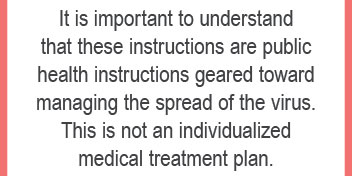By Howard Headlee, President and CEO, Utah Bankers Association
We are eight months into this pandemic, and our medical community has learned a lot about the COVID-19 virus. Still, I am concerned that many people who test positive believe that all they need to do is go home, isolate, and if things get worse or they have trouble breathing, go to the hospital.
It is important to understand that these instructions are public health instructions geared toward managing the spread of the virus. This is not an individualized medical treatment plan. If you want a personalized treatment plan, you need to reach out to your doctor.
I am not a doctor and I’m not giving professional advice, but if you are over 50 and you test positive for COVID, there are things you should be talking with your doctor about to proactively manage the progression of this virus. Bankers are professional risk managers and there are significant risks associated with COVID-19. Would a bank regulator ever let a bank approach a potentially catastrophic risk to a bank with the equivalent of a “go home, isolate and go to a hospital if things get bad” policy? I highly doubt it, so it’s simply unrealistic to expect a banker to embrace this approach to a life and death risk.
Good doctors have been testing, learning, and developing approaches to early, at-home treatments that align with what we are learning about this disease. Last month the vice chairman of Internal Medicine at Baylor University Medical Center published a peer-reviewed algorithm for early, at-home treatment. It addresses the three phases of the progression of COVID-19: 1. Viral replication, 2. Cytokine storm and 3. Microthrombosis.

Viral replication is the phase where the virus is introduced to your body and begins to grow. Limiting the virus’s ability to replicate is critical during the first seven days of the disease. There has not been enough time to develop new, specific drugs to treat COVID-19, but there are drugs that have been proven safe and effective for limiting the replication of other viruses that appear to also restrict the replication of COVID-19. Dr. McCollough calls these “off-target” anti-virals.
Cytokine storm is the phase when the body’s immune system kicks into overdrive in response to the virus. This can drive things like coughing, inflammation and difficulty breathing. Depending on how severe this gets, this is where the hospitalization phase can begin. Again, we have access to many treatments that safely and effectively treat inflammation (corticosteroids), even though none have been specifically developed for COVID-19.
The microthrombosis phase is what makes this particular virus so much more deadly than others. It causes your blood to clot and these little clots can create a lot of damage that, if not prevented, is very difficult to repair. Fortunately, we also have safe and effective treatments to prevent blood clots (antiplatelet drugs).
Dr. McCollough has published an algorithm for treatment for these phases of the disease (below). There may very well be other peer-reviewed, published treatment plans out there. I’m not saying this is the only one, or even the best one for you, but I am saying that “go home, isolate and go to the hospital if you can’t breathe” is not a treatment plan that anyone over 50 who is familiar with risk management should embrace.

To see the entire presentation, visit https://www.youtube.com/watch?v=cxmhvZ6eEI4
Because the early viral replication stages are so important, I suggest that you send this information to your doctor and ask if you can discuss what approach to the early at-home treatment you will pursue should you test positive for this virus. Just like credit, time is of the essence.

Here is the bottom line: Do not mistake the public health strategy of “Go home, isolate, and go to the hospital if you have difficulty breathing” for a personalized medical treatment plan. Your treatment plan has to come from your doctor. If you are over 50 years old or have one or more comorbidities, I strongly encourage you to reach out and talk to your doctor about the best research and what treatment they recommend if you test positive. Please don’t wait until you test positive to make those decisions. And if your doctor suggests you should go home, isolate and wait to see if things worsen, I would definitely get a second opinion. n
Howard Headlee, President and CEO, Utah Bankers Association
This story appears in Issue 4 2020 of the Utah Banker Magazine.







